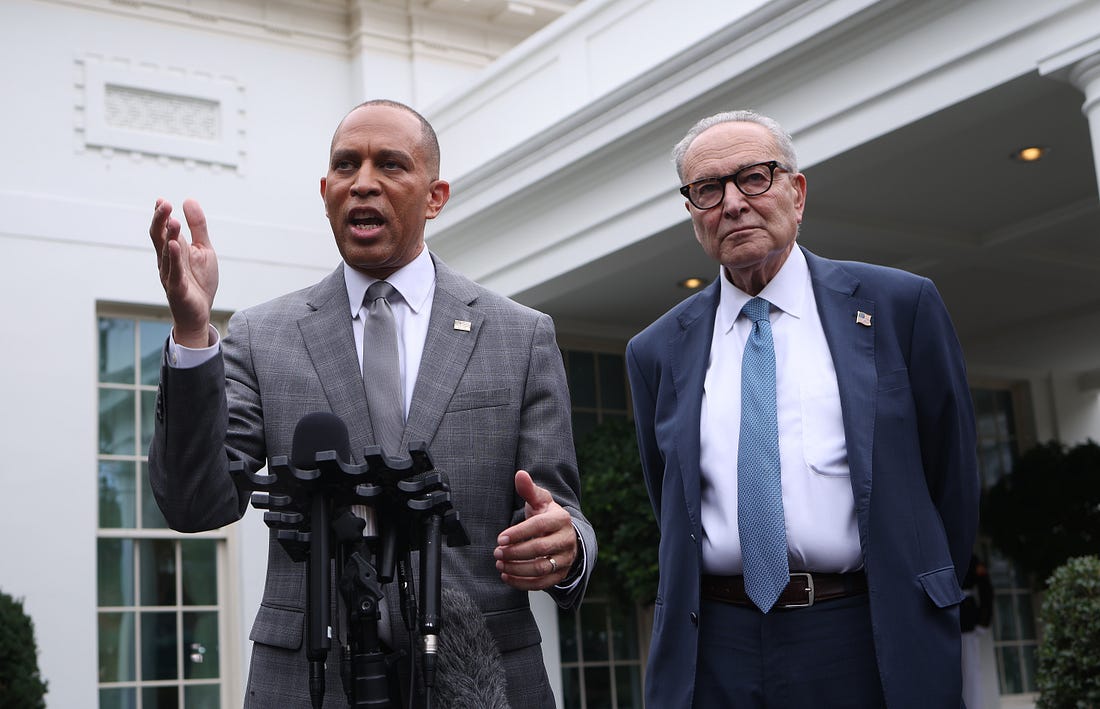|
 |
Democrats Are Winning the Shutdown Fight
Turns out Republicans still haven’t figured out the politics of health care.
HERE’S HOW YOU CAN TELL Democrats have the upper hand in the week-old shutdown fight: Marjorie Taylor Greene just endorsed their key demand.
“WE HAVE TO DO SOMETHING ABOUT THE ABSOLUTELY INSANE COST OF INSURANCE FOR AMERICANS,” the Georgia House Republican tweeted Monday evening. And she made clear that “something” in this case means extending the temporary Affordable Care Act subsidies set to expire at year’s end, which is the most visible item on the Democratic agenda.
“I was not in Congress when all this Obamacare, ‘Affordable Care Act’ bullshit started,” Greene wrote, describing herself as “not a fan” of the 2010 health care law that Republicans spent more than a decade trying to repeal. But, she went on to explain, “when the tax credits expire this year my own adult children’s insurance premiums for 2026 are going to DOUBLE, along with all the wonderful families and hard-working people in my district.”
For that reason, she said, she is “going against everyone on this issue”—i.e., going against her fellow Republicans, most of whom oppose an extension. And, she added, she doesn’t care a whit if it bothers GOP leaders trying to hold the line against negotiations. “Not a single Republican in leadership talked to us about this or has given us a plan to help Americans deal with their health insurance premiums DOUBLING!!!”
Greene’s claim about insurance costs checks out: If those extra subsidies expire, premiums for more than 20 million people buying coverage through Obamacare’s marketplaces will more than double on average, according to analysis from the research group KFF.¹
Greene’s characterization of GOP leadership also has the ring of truth. The political challenge for Republicans at this moment was entirely foreseeable, given that analysts were warning about the subsidy cliff more than a year ago and that Democrats were trying to raise it as an issue throughout the 2024 presidential campaign.
But despite all the indications that an Obamacare premium hike would be particularly tough on red districts and states, and on Republican-leaning constituencies like farmers and small business owners, GOP leaders seem to have thought they could tough out a standoff. They have refused even to discuss an extension in the context of a government shutdown fight, leaving unclear whether they are set on blocking one altogether (as more conservative members would prefer) or delaying a solution until the end of the year (as others seem inclined).
And maybe that recalcitrance will turn out to be a smart political play. The contours of this fight remain fluid, with the polls somewhat ambiguous and the insider machinations predictably opaque. But one week into the shutdown fight the signs of Republican weakness are impossible to miss, up to and including Trump declaring from the Oval Office on Monday that, “We have a negotiation going on right now with the Democrats that could lead to very good things. I’d like to see a deal made for great health care.”
He later walked that back a bit, with a Truth Social post on Monday evening saying negotiations have to wait until Democrats vote to reopen the government. But his own pollsters have been warning Republicans they let the subsidies lapse at their own political peril—a warning that appears to have registered with at least some House and Senate Republicans, even as their leaders have said no to negotiations.
These cracks in the Republican wall are conspicuous because the fissures on the other side have been nearly invisible. Democratic Senate leaders have been losing just three caucus members on votes to reopen the government under the GOP’s terms, with one of them being Pennsylvania Democrat John Fetterman (who dissents on such matters routinely) and another being Maine independent Angus King (who caucuses with the Democrats and has said he might soon start voting with the rest of them).²
This relative Democratic unity is not something a lot of people would have predicted. The party’s brand is in the tank, according to polls, thanks in part to extreme disappointment among base voters. High on their list of grievances is the way Senate Democratic Leader Chuck Schumer capitulated on a spending deal in March, when Trump’s unprecedented and unconstitutional power grabs and the destructiveness of Elon Musk’s DOGE gave Democrats a perfectly rational pretext for refusing to negotiate.
Trump’s authoritarianism is an even more valid pretext now. And if you read the actual Democratic position, you’ll see that putting new restrictions on Trump’s use of executive power is among the party’s demands. But it’s health care at the center of this debate, and it’s health care that has upended the dynamics so that even well-connected GOP strategists are now predicting their party will “cave.”
Which on second thought maybe isn’t so surprising—or shouldn’t be, if you know anything about the politics of health care.
